- Home
- T.A. Barron
The Great Tree of Avalon Page 3
The Great Tree of Avalon Read online
Page 3
Tamwyn gulped, despite his dry throat.
“Are you sure about that?” pressed the suspicious roof thatcher. His eyes, sunk deep into the rolls of flab on his cheeks like a pair of almonds in a mound of dough, scrutinized Tamwyn.
“Y-yes, Master Lout. I mean . . . Louse. No, Lott!”
The thatcher’s face turned as red as a ripe apple. “However old you are, you’re a dim-witted dunce. A rascally rogue! And if you don’t finish soon, you won’t get paid.”
“I mean to finish,” grumbled Tamwyn.
“Then do it.”
Tamwyn rolled his stiff neck. “Just let me stretch a moment, will you?”
Lott stamped his foot impatiently. But Tamwyn ignored him, trying without success to loosen his neck.
The young man sighed, feeling weighed down by more than the bale on his back. This was about as far away as he could get from his work as a wilderness guide—work that he greatly enjoyed. And not just because it took him to the wildest parts of Stoneroot, a realm so vast that in seven years of walking its rocky hills he’d covered less than half of it. No, there was something else that kept him roaming this realm—something that was, at once, more alluring than the scent of honeygrass sprinkled with dew, and more frightening than the look of an old troll’s eye.
Finding Scree. The work of guiding people through uncharted parts of the realm allowed Tamwyn to keep searching for his lost brother. But since the start of the drought, fewer people had been venturing into the wilderness. And so, until he could guide again, he’d been trying out other kinds of work.
Such as weaving thatch. Yesterday, when he’d wandered into this village, he’d assumed that by helping Lott he could learn the work of a thatcher. As it turned out, all he’d done was the work of a freight ox. Except that even a freight ox was smart enough not to climb ladders.
Tamwyn licked his dry lower lip, tasting the bitter mix of salt and soot. He was thirstier now than he’d been even in the hottest days of summer. Hang the drought! Right now, he’d give anything to be drinking from the water gourd that hung from his belt—but that was empty again. Or even better . . . from a clearwater stream, one that tumbled through lush grasses. Or through white lilies, like that stream he’d found last year by the—
“Move!” Lott thundered again from below, making all three of his chins jiggle. “That thatch won’t carry itself to the top.”
“Right, Master Lott.”
“And don’t you drop another bale, or you’ll lose not just your pay, but your supper.” He spoke that last word with something close to reverence; his chins turned up in a triple grin. “The wife promised me grilled rabbit tonight, since I’ve been working so hard on this roof.”
Tamwyn bit his tongue.
“Think I’ll just check on her right now,” Lott announced. “Could be she’s needing some help in the kitchen. Mmmm . . . grilled rabbit.” He smacked his lips, then shot his laborer a murderous glance. “And by the time I get back, you’d better be done.”
“Right.” The very mention of food had reminded Tamwyn that he wasn’t just thirsty, but hungry as well.
Oh, for a fistful of fresh moonberries, all plump and juicy! But grilled rabbit... he could almost smell it, simmering on the fire, dripping with juices. Like any bear or hawk he’d seen in the wilderness, he didn’t mind eating the meat of another creature—just as long as the food had been killed swiftly, prepared without waste, and eaten with the usual words of thanks. He almost grinned, wondering whether a hungry bear ever paused to say the Drumadian Grace.
Before he could eat and drink, though, he’d have to finish. He’d promised Lott that he’d do the job. And if Scree had taught him anything, it was that promises matter. Eaglefolk were nothing if not true to their word! Except that Scree himself had promised, on the day their mother died, that the two brothers would never be separated.
Tamwyn wiped the sleeve of his brown tunic across his brow, brushing away whatever had made his eyes water. He shifted the bale on his shoulder and climbed up another rung. And another. Several flakes of soot settled on his eyelashes, but he ignored them. At least they weren’t lice.
Just three more rungs to go. Then I can dump this load for good.
Shaking with the weight, Tamwyn heard the jangle of the sack of nails in his hand. Like the bells, small and large, that chimed and clanged and rattled throughout the villages of Stoneroot, there was something oddly comforting in that sound. Tamwyn couldn’t explain why, but he felt grateful that he’d spent so many years—ever since he’d lost Scree—in the land of bells. That was one of Stoneroot’s most recognizable qualities: as traditional as the houses made with roofs of thatch and walls of flatrock; as noticeable as the northern mountains that could be seen from almost any part of the realm.
Bells. They hung from the necks of plow horses, and even from the plows themselves. They jangled with the steps of pigs, sheep, and goats. They topped the stone houses, barns, weather vanes, and doors to cellars that held great vats of brewing beer. And they even dangled from the belts of people such as Lott. And Tamwyn himself, who wore a small quartz bell on the hip of his tunic . . . a bell that rang steadily whenever he ran through forests and vales, as free as a feather on a breeze.
Twisting his head slightly against the bale, he peered down at the village. With so many identical houses—all built with the same flatrock walls, all in straight rows—the village resembled a field of big, squarish pumpkins. Even more so because it was now autumn, and like everywhere else in Stoneroot, the rocks were turning their seasonal shades of orange and gold. Even way up north, in the upper reaches of Stoneroot, where the drought seemed to be sapping the colors out of everything, the rocks still changed with the seasons.
Tamwyn bit his lip, wondering. If the rocks of Stoneroot changed colors every autumn, winter, spring, and summer, would the same be true in Avalon’s other realms? All seven of those realms were roots of the same Great Tree, to be sure . . . but whether they, too, changed every season was a mystery. Would streams and ponds change color in Waterroot? How about the dark caverns of Shadowroot? And the legendary trees of Woodroot?
He shook his head. Trees! Now that was really difficult to imagine. The very idea of a tree changing colors!
With a sigh, he thought of how little he knew about his own realm, let alone the others. Even after seven years of exploring the wildest parts of Stoneroot, looking for Scree, he’d found no sign at all of his brother . . . and no end to the surprises of this realm. Not only in its varied landscape, but in its creatures, too—from the hill-tall giants of the high peaks to the tiny mite faeries whose largest village could fit on his thumbnail.
Just how big Stoneroot really was, he could only guess. All he knew was that he could walk a full month in any direction from most parts of the realm and never reach the sea of mist that hugged its shores. And if it was so enormous, as just one root of the Great Tree . . . think how incredibly vast the Tree itself must be—combining the seven root-realms, the trunk that had barely even been explored, the magical portals inside the heartwood, whatever branches might exist, and the mysterious stars on high. Such size, such scale, was almost beyond imagining.
“Are you dead or alive, you stupid slug? Here you are, just where I left you.”
Lott’s voice jolted Tamwyn back to his job. He heaved himself up another rung. Only two more to go. Uuugggh. Just one left. He lifted his thigh, set his bare foot on the last rung, and—
Oww! A louse bit the back of his ear. Furious, Tamwyn shut his eyes, trying to hold back his temper. Why’d you do that? he demanded with his thoughts—the same silent language that helped him talk with almost any creature. I’m not your next meal.
The louse responded with another bite, this time on his earlobe.
Stop, roared Tamwyn’s inner voice. By the Thousand Groves, stop! It took all his concentration to keep himself from dropping the bale. He couldn’t even reach up to rub his sore ear. All he could think about was climbing that very last step.
Then he’d dump this cursed load—and promptly break the Drumadians’ first law, the one about never murdering a fellow creature. And enjoy it, every instant.
He straightened his leg. The ladder creaked. Suddenly the rung under his foot snapped in two, pitching Tamwyn forward into the wall. His nose and cheek smashed into the stone. Desperately, he clutched at the ladder, and then at the bale that was slipping off his shoulder.
Too late! The bale plunged to the ground and exploded at Lott’s feet in a black cloud of soot.
“Fool of a . . . of a . . . of a fool! An acorn has more brains than you.” His whole body quivering, Lott glared up at him with eyes that could have set thatch aflame.
“I’m sorry, Master Lott.” Tamwyn placed both feet on a lower rung. “I didn’t think—”
“Didn’t think. That’s the truth!”
“No, the ladder . . .” Tamwyn pointed down to the broken rung. But as he moved his arm, the sack of nails hit his knee and knocked loose. Nails flew in every direction, smacking the wall of the house, bouncing off the ladder, and pouring down on Lott’s head. Tamwyn grabbed for the sack, and in doing so dropped the hammer. He bobbled it, dropped it again, then barely managed to catch it between his foot and the rung.
Lott tore a handful of nails out of his hair and shook his fist at Tamwyn. “You’re a bloody blight! A poisonous plague!”
He hurled the nails straight at Tamwyn. But as the young man ducked, he moved off the hammer. The tool plunged downward—and slammed onto Lott’s plump foot.
“Aaaaowww!” bellowed the thatcher, hopping around in pain. He tried to bend over to hold his injured foot, but his prodigious belly kept him from reaching it. All he could do was hop on one foot, curse, sputter, squeal, and groan. Spittle drooled down his triple chin.
Awkwardly, he stumbled off toward his own house at the other end of the village. “I’ll be back, you . . . you stupid, sluggish, scramble-brained scalawag! And when I return, you’d just better have that bale back up on top. Or I’ll dice you up and feed you to the fleas!”
Tamwyn kicked one foot angrily at the air. But the motion jolted the ladder, and he almost fell off. Cursing to himself, he didn’t even hear the gentle ringing of the bell on his hip.
2 • Banished
Still seething, Tamwyn took a swipe at the louse that had bitten his ear. But it had already dropped off. Curse that beast. And this ladder. And this job!
Grabbing the upper end of the ladder, he pulled himself up to the wooden platform at the edge of the roof. There he sat, legs dangling, and stared down at the burst bale of thatch on the ground. His fists clenched in anger. Why should he clean up that fat man’s mess? And why should he stay around here any longer?
That was the answer: Just leave. If he set off running east, sometime during the night he’d reach the coastal marshes. Though he hadn’t been there for a few years, he remembered vividly those flowing pools of watergrain. Despite the drought, there should be at least some water there. More than he’d found in weeks. And elf berries, too. A bit overripe, maybe, given the season—but still good eating.
He ran a hand through his straight black hair, the locks so long that they reached almost to his shoulders, and pulled out some clumps of thatch. And he sighed, knowing he wouldn’t be eating any elf berries tonight. No, he’d be staying right here until he finished the job. Not because he wanted to. And not because Lott deserved it.
Because he’d given his word.
He gave his knee a slap. If only he’d never stopped in this runty little village. Much as he loved to wander the landscape, finding surprises on the way . . . sometimes those surprises were like stepping into a pit of angry gnomes.
All right then, better get started before it’s too dark. He knew well that these days many creatures roamed the lands after starset. Whether they were just homeless spirits walking aimlessly, or gobsken looking for some beer to steal—or some trouble to start—they were usually worth avoiding.
First, though, I’ll need to fix this blasted ladder. He reached down to his waist, feeling for the coiled length of vine he always carried on his tunic belt, right beside his dagger. As he unraveled the vine, his hand brushed against the quartz bell on his hip, which sounded its gentle, earthen tone.
Just then, an owl hooted softly from the tall harkenfruit tree just beyond the village. Tamwyn stopped and looked up—right into the starset, that magnificent burst of golden light from the stars that marked the day’s end. Bright beams traced the tree, illuminating every branch and twig so that they themselves looked like trees of light. Thin leaves shimmered in the breeze, glowing gold. And beyond the tree, high peaks on the horizon lifted, ridge upon ridge, like rows of waves on a shining sea.
Even the village, its gray stones catching the light, seemed at this moment bejeweled. And something more, Tamwyn realized.
Built from whatever materials the land offered freely— stone and wood and thatch—this village simply belonged here. It was rooted in this place, as much as the harkenfruit tree. As much as the nearby fields of ripened oats and barley, the stacks of summer hay, the barrels of dark brown beer in almost every cellar, the shrine to Elen built by Drumadian followers, and the large piles of compost and dung. As much as the litter of tiny pigs over by the common barn who lay sprawled on top of their enormous mother, using her as a living bed.
The aromas of barley, dung, and pigs wove into the air, mixing with the smell of thatch, for they, too, belonged. Just like the square iron bells set on the ridge beam of every house. The owl hooting from the tree. The rough-hewn stones of the village walls.
Tamwyn cocked his head thoughtfully. Everything around him—this village, this landscape, even this little quartz bell on his hip—all seemed to fit. To belong.
Unlike Tamwyn himself. He wiped some sooty thatch off his brow. Where did he belong, after all?
Swinging his legs at the edge of the roof, he looked again at the shining peaks in the distance. Maybe he just belonged out there, in those woods and fields and ridges where he loved to run. Clumsy as he felt in a village like this . . . something happened when he ran free, leaping over stones and streams.
Something magical.
Craning his stiff neck, he lifted his gaze to the stars. So many of them—and so beautiful. He traced the outlines of some favorite constellations: There was Pegasus, ears back and eyes ablaze, soaring on high. And the Twisted Tree, reaching its long branches across the shadowed sky.
He smiled, wondering what it would be like to run—really run—among those stars, weaving through the clusters of light as if they were groves of trees. Oh, to stride across those starry fields!
Even as he watched them now, the stars dimmed, bringing on the night. While their brightness faded, their individual positions grew more clear, making it easier to connect them into constellations. Tamwyn wondered, as he’d done so often, what the stars of Avalon really were . . . and whether someone, someday, could find a way to explore them.
He pursed his lips, thinking. Nobody knew why the stars dimmed at the end of every day, after that final flash of golden light. Nor why they swelled bright again every morning. Just as nobody knew why, here in Stoneroot, the stars shone brighter than in any other realm—something he’d learned from wandering bards. How different from Shadowroot, where the stars didn’t even shine at all . . . All these questions added up to the great unsolved riddle of the stars’ true nature—something that had puzzled people through all the ages of Avalon.
Many a night, as Tamwyn peered up at the stars from a sheltered glade or a mossy rock, he’d pondered such things. The stars always seemed so distant, so mysterious. Frightening somehow, and yet alluring. Almost as if they called to him.
How he’d love to travel there. Yes, and to all the other realms of Avalon. He’d find the right portals and travel through them to other lands, other peoples, other trails that he could run. Perhaps he’d even find some way to explore upper Avalon—the trunk itself, and whatever lay beyond! Why, maybe he’
d even discover other kinds of creatures there . . . creatures that no one in the Seven Realms knew existed. He could be a great explorer—just like Krystallus Eopia, the famous son of Merlin.
Ouch! He winced from the louse biting his forearm.
With a scowl, he flicked away the little scoundrel. Some explorer he was! Why, today he’d ventured all the way to the topmost rung of Lott’s rickety ladder. And even battled some man-eating lice.
His legs kicked at the air by the roof’s edge. Truth was, the life he was leading couldn’t have been any more different from that of Krystallus. Or from his own shadowy beginnings. He bit his lip, recalling his very first memory—those vague, confused images of a fiery mountain, an old man with the wings of an eagle... and a woman’s warm embrace.
He shook his head. How could he even be sure that memory was real? More and more, that night on the fiery mountain seemed just a dream. A twisted dream. He hadn’t even dared to talk about it with Scree, not after everything they’d been through, although it hovered between them like a ghoul—always present, yet always invisible.
Not that this unspoken memory had spoiled their time together—no, far from it. Scree and Tam (as his brother called him) had ranged widely, exploring much of Fireroot’s volcanic lands. They’d climbed peaks, crawled through lava tunnels, slid down glass-smooth slopes of black obsidian, hurled fistfuls of ash at each other’s heads, wrestled among spouting flame vents . . . and so much more. Just as long as the boys avoided any contact with the warlike flamelons, and returned home to their cave by dark, they’d had plenty of freedom. And they’d also had a genuine family, thanks to the woman who was mother to them both: for Scree, by adoption; for Tamwyn, by birth. She had always been there to welcome them home, her orange eyes aglow.
Until the day she died and left them with nothing but each other.

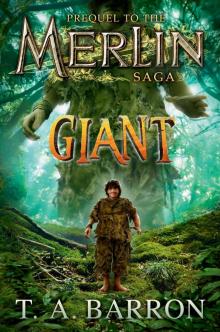 Giant
Giant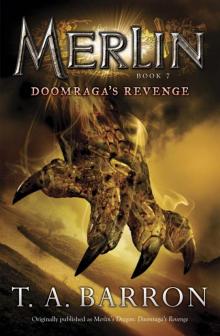 Doomraga's Revenge
Doomraga's Revenge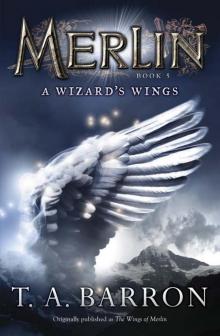 A Wizard's Wings
A Wizard's Wings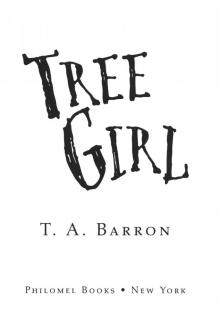 Tree Girl
Tree Girl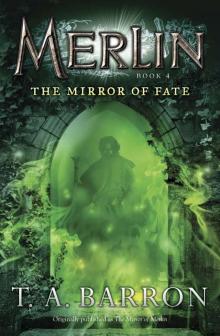 The Mirror of Fate
The Mirror of Fate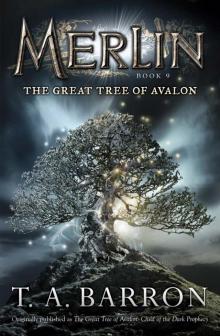 The Great Tree of Avalon
The Great Tree of Avalon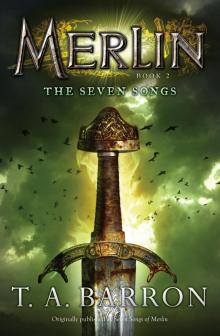 The Seven Songs
The Seven Songs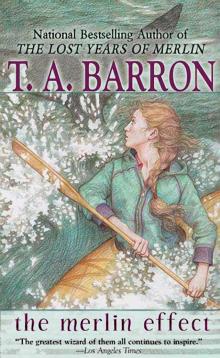 The Merlin Effect
The Merlin Effect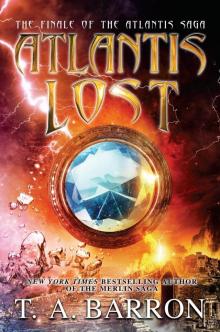 Atlantis Lost
Atlantis Lost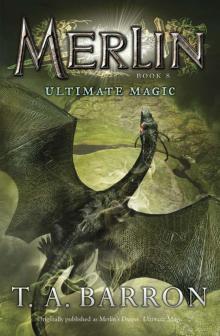 Ultimate Magic
Ultimate Magic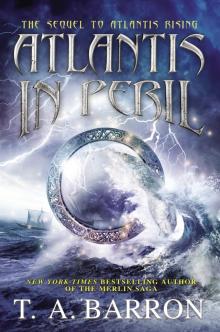 Atlantis in Peril
Atlantis in Peril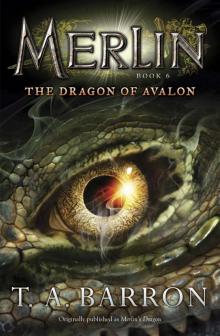 The Dragon of Avalon
The Dragon of Avalon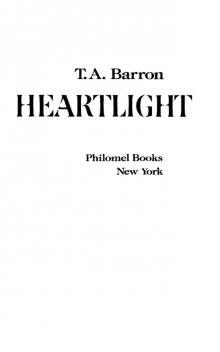 Heartlight
Heartlight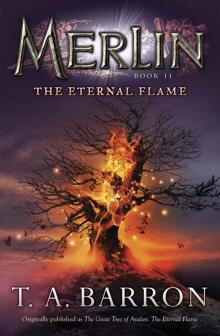 The Eternal Flame
The Eternal Flame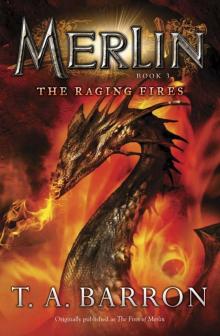 The Raging Fires
The Raging Fires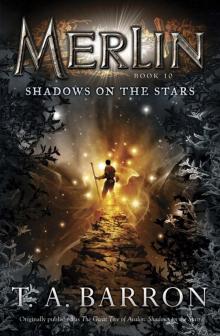 Shadows on the Stars
Shadows on the Stars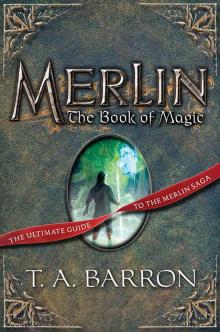 Merlin: The Book of Magic
Merlin: The Book of Magic The Lost Years
The Lost Years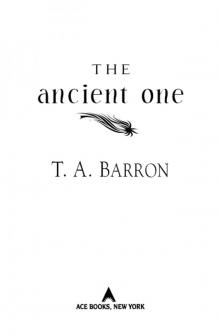 The Ancient One
The Ancient One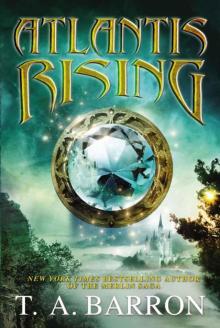 Atlantis Rising
Atlantis Rising